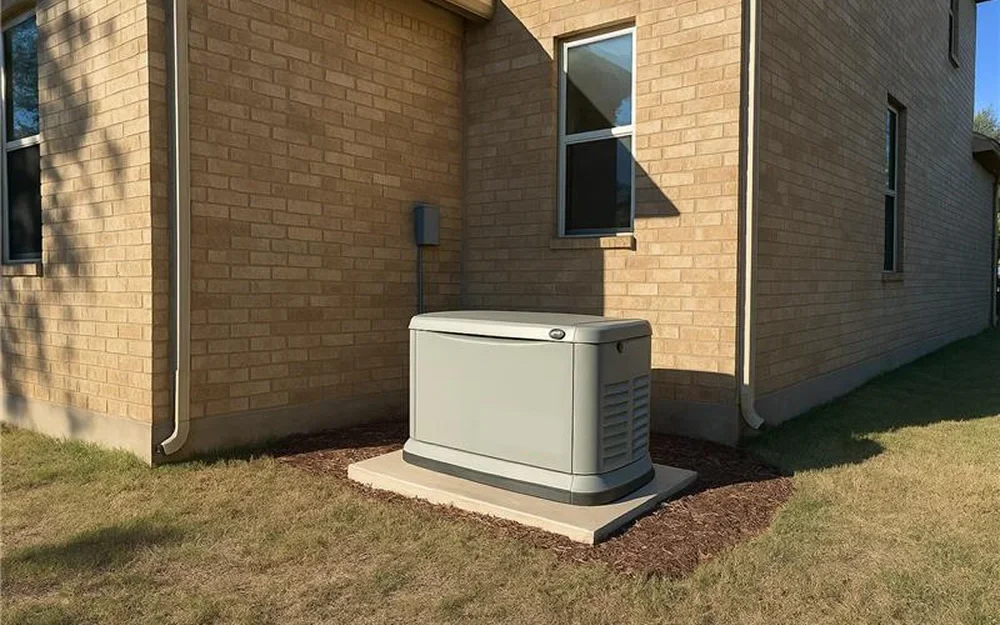How to Insulate Your Attic
5 minute readHow to insulate an attic, what it costs, and how it reduces your electric bill
Home > BKV Energy Blog > All Posts > How to Choose a Generator for Your Home
How to choose the right generator for your Texas home
6 minute read • Last update May 2025

Choosing the right generator for your home isn’t just about keeping the lights on—it’s about protecting your comfort, safety, and financial stability during power outages. With severe weather and rising strain on Texas’ electric grid, backup power solutions have become essential.
When choosing a generator, you should evaluate the following:
Start by identifying which appliances and systems are essential to keep your household running during a power outage. These typically include:
Once you’ve established these critical needs, calculate the total wattage required to run them all at the same time, including any startup (surge) wattage for larger appliances.
While some homeowners may opt for whole-home generator systems, most only require coverage for these essential functions, especially during short-term outages. Whole-home coverage offers seamless comfort, powering everything from laundry machines to hot water heaters, but it comes with a higher price tag and installation complexity. Choosing between essential-only and full-home coverage depends on your lifestyle, location, and how long you expect outages to last in your area.
Each fuel type has trade-offs:
In Texas, fuel availability during disasters like Winter Storm Uri in 2021 has shown the importance of planning for long-term access, especially when supply chains are disrupted.
Compare continuous and peak runtime specs:
For portable units, check the fuel tank capacity and plan for refueling every 8–12 hours. For standby generators connected to propane or gas lines, expect extended runtimes without manual refueling.
Generator noise levels typically range from 50–80 decibels. That can be the difference between quiet operation and lawnmower-level disruption.
The transfer switch routes power from your generator to your home.
Professional installation is mandatory in most jurisdictions to ensure code compliance and prevent dangerous backfeeding.
To size your generator properly, total the wattage of essential appliances and systems you’ll want running during an outage.
Typical household essentials:
| Appliance or System | Estimated Wattage |
|---|---|
| Refrigerator | 700 watts |
| Central AC (small unit) | 3,500 watts |
| Electric stove | 2,000 watts |
| Wi-Fi router + laptop | 150 watts |
| Lights and phone chargers | 300–500 watts |
Example scenarios (essential-only coverage):
These estimates assume only core systems are powered. Adding luxury items (hot tubs, pool pumps, EV chargers, etc.) significantly increases wattage needs.
Always consult a licensed electrician for proper load calculations and system compatibility.
Texas has experienced a surge in extreme weather events, from winter freezes to hurricanes to heat waves, leaving millions without power for days in freezing conditions.
The state also faces grid instability from rapid population growth, rising electricity demand from data centers, and increasingly volatile summers and winters. Given this reality, preparing for winter storms is critical to ensure your household remains safe, warm, and powered during prolonged outages.
Texas’s growing population, aging infrastructure, and increasing climate volatility make reliable backup power more important than ever. Whether you’re protecting your livelihood, health, or day-to-day comfort, investing in a home generator is a proactive step toward long-term energy resilience.
For more information about different types of generators, check out our article The Best Home Generators for Power Outages.
Before installing a generator:
Expect to pay $5,000–$12,000 for standby generator installation, depending on load, fuel source, and site prep needs.
Generators require consistent maintenance to remain reliable:
Routine servicing minimizes the risk of breakdowns and extends the lifespan of your equipment.
When evaluating generator options, several brands consistently stand out for their performance, reliability, and customer support. Below is a comparison of the top residential generator brands to help you assess which one best fits your home’s backup power needs:
| Brand | Strengths | Best Use Case | Warranty | Fuel Type Compatibility |
|---|---|---|---|---|
| Generac | Industry leader in standby systems; broad service network | Whole-home backup power | Typically 5 years | Natural gas, propane |
| Champion | Cost-effective, reliable; strong portable and standby options | Budget-friendly, versatile applications | 3–5 years | Gasoline, propane |
| Kohler | Premium components; quiet operation; long-term reliability | High-end standby power with low noise | 5+ years (often extended) | Natural gas, propane |
| Honda | Ultra-quiet portable units; renowned for quality and longevity | Short-term, small-load backup | 3 years residential | Gasoline (some inverter hybrids) |
When evaluating generator brands, consider the following factors to ensure you’re investing in a system that meets your performance needs, budget, and long-term service expectations:
While not as common as solar or energy-efficiency rebates, some opportunities do exist for generator buyers:
Be sure to document all aspects of your generator installation, including signed contracts, receipts, permitting paperwork, and inspection approvals. Maintaining a clear paper trail not only ensures compliance with local codes and utility regulations, but also positions you to take full advantage of potential financial benefits.
These may include utility rebates, homeowners’ insurance discounts, and increased home resale value. Having verifiable proof of professional installation and code adherence can streamline claims processes, support tax documentation if incentives become available, and provide peace of mind when it’s time to sell your home.
If you live in an area with frequent outages, rely on medical equipment, or want to protect food and comfort systems during grid instability, a generator is a smart, long-term investment. Prioritize safety, size your system correctly, and partner with licensed professionals for installation and maintenance.
Graham Lumley, Growth Product Manager at BKV Energy, leads digital and traditional marketing strategies, focusing on educating Texans about the state's deregulated energy market. With over 10 years of marketing experience, he creates content to help consumers understand and save on their energy bills, bringing a fresh and dynamic approach to the industry.

How to insulate an attic, what it costs, and how it reduces your electric bill

Energy Saving Tips Home Improvement
Reduce heat loss, improve comfort, and lower winter electricity costs
Get $50 off your electric bill!
Use code BKVEJOINUS50
Enter your zip code to shop BKV Energy's affordable, fixed-rate Texas electricity plans. Use the promo code for $50 off your electric bill.